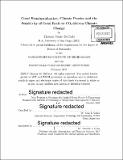| dc.contributor.advisor | Anne L. Cohen. | en_US |
| dc.contributor.author | DeCarlo, Thomas Mario | en_US |
| dc.contributor.other | Woods Hole Oceanographic Institution. | en_US |
| dc.date.accessioned | 2017-05-11T19:54:34Z | |
| dc.date.available | 2017-05-11T19:54:34Z | |
| dc.date.copyright | 2017 | en_US |
| dc.date.issued | 2017 | en_US |
| dc.identifier.uri | http://hdl.handle.net/1721.1/108899 | |
| dc.description | Thesis: Ph. D., Joint Program in Oceanography/Applied Ocean Science and Engineering (Massachusetts Institute of Technology, Department of Earth, Atmospheric, and Planetary Sciences; and the Woods Hole Oceanographic Institution), 2017. | en_US |
| dc.description | Cataloged from PDF version of thesis. | en_US |
| dc.description | Includes bibliographical references. | en_US |
| dc.description.abstract | Scleractinian corals extract calcium (Ca²⁺) and carbonate (CO₃²⁻) ions from seawater to construct their calcium carbonate (CaCO₃) skeletons. Key to the coral biomineralization process is the active elevation of the CO₃²⁻ concentration of the calcifying fluid to achieve rapid nucleation and growth of CaCO3 crystals. Coral skeletons contain valuable records of past climate variability and contribute to the formation of coral reefs. However, limitations in our understanding of coral biomineralization hinder the accuracy of (1) coral-based reconstructions of past climate, and (2) predictions of coral reef futures as anthropogenic CO₂ emissions drive declines in seawater CO₃²⁻ concentration. In this thesis, I investigate the mechanism of coral biomineralization and evaluate the sensitivity of coral reef CaCO₃ production to seawater carbonate chemistry. First, I conducted abiogenic CaCO₃²⁻ precipitation experiments that identified the U/Ca ratio as a proxy for fluid CO₃²⁻ concentration. Based on these experimental results, I developed a quantitative coral biomineralization model that predicts temperature can be reconstructed from coral skeletons by combining Sr/Ca - which is sensitive to both temperature and CO₃²⁻ - with U/Ca into a new proxy called "Sr-U". I tested this prediction with 14 corals from the Pacific Ocean and the Red Sea spanning mean annual temperatures of 25.7-30.1 °C and found that Sr-U has uncertainty of only 0.5 °C, twice as accurate as conventional coral-based thermometers. Second, I investigated the processes that differentiate reef-water and open-ocean carbonate chemistry, and the sensitivity of ecosystem-scale calcification to these changes. On Dongsha Atoll in the northern South China Sea, metabolic activity of resident organisms elevates reef-water CO₃²⁻ twice as high as the surrounding open ocean, driving rates of ecosystem calcification higher than any other coral reef studied to date. When high temperatures stressed the resident coral community, metabolic activity slowed, with dramatic effects on reef-water chemistry and ecosystem calcification. Overall, my thesis highlights how the modulation of CO₃²⁻, by benthic communities on the reef and individual coral polyps in the colony, controls the sensitivity of coral reefs to future ocean acidification and influences the climate records contained in the skeleton. | en_US |
| dc.description.statementofresponsibility | by Thomas Mario DeCarlo. | en_US |
| dc.format.extent | 212 pages | en_US |
| dc.language.iso | eng | en_US |
| dc.publisher | Massachusetts Institute of Technology | en_US |
| dc.rights | MIT theses are protected by copyright. They may be viewed, downloaded, or printed from this source but further reproduction or distribution in any format is prohibited without written permission. | en_US |
| dc.rights.uri | http://dspace.mit.edu/handle/1721.1/7582 | en_US |
| dc.subject | Joint Program in Oceanography/Applied Ocean Science and Engineering. | en_US |
| dc.subject | Earth, Atmospheric, and Planetary Sciences. | en_US |
| dc.subject | Woods Hole Oceanographic Institution. | en_US |
| dc.subject.lcsh | Corals | en_US |
| dc.subject.lcsh | Coral reef ecology | en_US |
| dc.title | Coral biomineralization, climate proxies and the sensitivity of coral reefs to CO₂-driven climate | en_US |
| dc.type | Thesis | en_US |
| dc.description.degree | Ph. D. | en_US |
| dc.contributor.department | Joint Program in Oceanography/Applied Ocean Science and Engineering | en_US |
| dc.contributor.department | Woods Hole Oceanographic Institution | en_US |
| dc.contributor.department | Massachusetts Institute of Technology. Department of Earth, Atmospheric, and Planetary Sciences | |
| dc.identifier.oclc | 986240998 | en_US |
